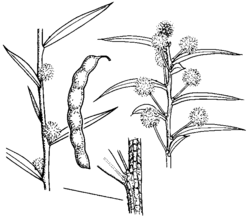Common name: dagger wattle
Acacia siculiformis A.Cunn. ex Benth. APNI* Synonyms: Racosperma siculiforme (A.Cunn. ex Benth.) Pedley APNI*
Acacia siculiformis var. bossiaeoides Benth. APNI*
Acacia stuartiana F.Muell. ex Benth. APNI*

Description: Decumbent to erect shrub 0.5–3 m high; bark smooth but ± tessellated, grey; branchlets ± terete, resinous, glabrous.
Phyllodes ± rigid, very narrowly elliptic or lanceolate to linear-lanceolate, straight to slightly curved, 1–3 cm long ( sometimes to 3.5 cm long), 2–4 mm wide, midvein prominent, lateral veins not evident or obscure, apex pungent-pointed; 1 obscure gland 2–6 mm above base, sometimes absent; pulvinus absent or obscure.
Inflorescences simple, 1 or 2 in axil of phyllodes; peduncles 0–10 mm long, glabrous; heads globose, 30–45-flowered, 4.5–7 mm diam., bright yellow or pale yellow to ± white.
Pods ± straight, ± flat except slightly raised over seeds, barely to slightly or irregularly more deeply constricted between seeds, 1.5–5 cm long, 4–7.5 mm wide, papery, smooth with few fine lateral veins near margins, glabrous, resinous; seeds longitudinal; funicle filiform.
Flowering: August–November.
Distribution and occurrence: south from Glen Innes to Walcha in the north, and west from Captains Flat to Gundagai in the south; also recorded from Joadja and near Bathurst. Grows in dry sclerophyll forest and woodland, often in granite-derived soils.
NSW subdivisions: NT, CT, ST, SWS
Other Australian states: Vic. Tas.
The the name refers to the dagger-like shape of the phyllodes. A. siculiformis var. bossiaeoides Benth. is sometimes recognized; it differs in being more diffuse, with peduncles usually shorter than usual. Similar to A. maitlandii which has viscid branchlets.
Text by P.G. Kodela
Taxon concept: P.G. Kodela & G.J. Harden, Flora of NSW Vol. 2 (2002)
APNI* Provides a link to the Australian Plant Name Index (hosted by the Australian National Botanic Gardens) for comprehensive bibliographic data
***The AVH map option provides a detailed interactive Australia wide distribution map drawn from collections held by all major Australian herbaria participating in the Australian Virtual Herbarium project.
|


